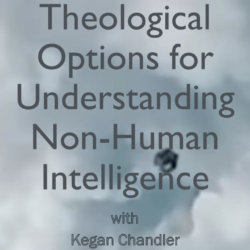This is part four of our series on original sin. Last time Kegan Chandler and Jerry Wierwille discussed their different views of original sin and the resultant human condition. In this final part of our series, we circle back to Romans 5 one last time and both explain how they understand it. What drives our desire to sin? Is it our mortality, our toxic environment, or our fallen flesh? Listen in as these two scholars discuss this important issue.
—— Links ——
- Part 1: 321 Origins of Sin (Kegan Chandler)
- Part 2: 322 Inherited Sin in Romans 5 (Jerry Wierwille)
- Part 3: 323 Original Sin Debate 1 (Kegan Chandler vs. Jerry Wierwille)
- More podcast episodes with Kegan Chandler
- More podcast episodes with Jerry Wierwille
- If you’d like to support Restitutio, you can donate here.
- Intro music: Good Vibes by MBB Attribution-ShareAlike 3.0 Unported (CC BY-SA 3.0) Free Download / Stream: Music promoted by Audio Library








Well, I must admit that I really enjoyed this 4 part series, and was impressed by everyone in the discussion.
You were correct in the post-script of the previous episode, Sean, I did enjoy Kegan’s points here. For anyone who’s interested, I’ll copy some relevant texts that he was alluding to, in case anyone was interested. Additionally, I enjoyed the part of the discussion where they discussed one sin lead to more, as it reminded me of a Mishna from Pirkei Avot, sayings of the fathers 4.2: Ben Azzai said: Be quick in performing a minor commandment as in the case of a major one and flee from transgression; For one commandment leads to another commandment, and transgression leads to another transgression; For the reward for performing a commandment is another commandment and the reward for committing a transgression is a transgression.
Best,
Brian
Rabbinic Discourse on the Yetzer Hara is found in b. Yoma 69b and Genesis Rabbah 9:7.
Hi, Brian;
‘Rabbinic Judaism’ is largely a post-New Testament reconstruction of the pre-70CE Judaisms, and is often shaped by anti-Pauline and anti- Jewish Christian polemics. It’s use for New Testament studies has to treated with extreme caution and care.
Good series, thanks Sean! I definitely agree with Kegan on this issue, perhaps not in every detail, but in general. This has much to do with my dislike of Augustine. I do not think that any one in history has done more damage to the simple faith of Jesus and his apostles than Augustine. In fact, not only has our mortality exacerbated our natural inclinations for self-preservation, but Augustine’s long standing and universally accepted doctrine of original sin itself has exacerbated the sin problem in man by convincing millions throughout history that they were bound to sin by nature.
I think Jerry is misreading Rom. 5, specifically in his taking the ‘condemnation’ of which Paul speaks to be God’s final and eternal wrath. In the context of the passage it seems to me to be referring to the sentence of death which has come upon all through Adam’s sin, i.e. all are condemned to die. This is different from the second death which is God’s wrath against each man’s personal sin.
Hi, Troy;
Augustine certainly made his mistakes – but don’t throw out any ‘baby’ with the bath water.
Most Pauline scholars would see Rom. 7:7-25 as Paul’s pre-Christian experience of the inability of the Jewish Torah to totally counter the power of Sin – which Adam’s transgression had unleashed into the world of Mankind. Through the Torah, all intelligent Jews come to personally ‘experientially know’ (Gk. ‘epignosis’) that they are morally imperfect (Rom. 3:20; cf. 7:8-25; Gal. 3:24 ). The only ultimate solution to Mankind’s sin-problem is not the mere human ‘will power’ (cf. Rom. 7:18) of mere ‘physical flesh and blood’ (Gk. ‘sarkinos’; Rom. 7:14) – but reception of the Divine Spirit, mercifully mediated to us through Jesus (Rom. 8: 2-16; Gal. 5:6-26).
This was a great series. Thank you, Sean, for organizing it, and thank you, Jerry and Kegan, for all the work you two did in preparation and execution.
I find myself agreeing more with Kegan (though certainly also with Jerry in significant respects), but I wonder if Kegan’s position can be strengthened by making a minor adjustment.
Kegan interprets Romans 5:12b to mean that our mortality influences us to sin. So he seems to hold that, per Paul, the *central explanation* why Adam’s sin results in our sinfulness is because he made us mortal and our mortality makes us sin. This seems problematic, both because Paul himself never seems to make the arguments that Kegan does, e.g. that we have naturally good self-preservation instincts which we twist after we realize we’re mortal, and (more importantly) because this seems implausible in many cases.
Specifically, when children develop their moral awareness and so start to commit sin, it seems that their sin can be attributed, in large part, to the weakness of their will to control their passions (even though they retain libertarian free will to do so). Any parent can attest to this! But we would never want to say that children have *an awareness of their mortality* which inclines them further to sin. (Indeed, the common wisdom is that youths sin because they lack a sense of their mortality, and that we can be more morally sober by reflecting on our mortality.) So by not seeing Paul as attributing universal sin fundamentally or solely to mortality, we can avoid problems where it seems that sinful inclinations are clearly not attributable to mortality, such as in young children.
My proposal to solve this: the tricky phrase “upon which” (eph ho) could be understood merely *sequentially* but not by attributing our sin to our mortality as a cause. In this case, Paul would be saying, roughly, “Sin entered the world through Adam, and universal mortality through this sin, and so all became subject to death, and then all committed sin.” In other words, Paul would be saying, rightly, that Adam caused the whole world to fall under the harms of mortality, sinfulness, and condemnation, but he wouldn’t be aiming to attribute our sinfulness to our mortality. Rather, he would be stating what seems to be obvious from the Genesis narrative: Adam got kicked out and man became mortal, then men became sinful. Such an interpretation would also preserve the legitimate sense in which our mortality *sometimes* influences us to sin, but it would also avoid the undesirable hypothesis that our mortality is the *central driver* in influencing us to sin.
Such an interpretation would also allow us to attribute universal sinfulness to Adam’s sin, without positing some heritable trait with which Adam was infused and which is present in all his offspring. Paul clearly attributes universal sinfulness to Adam’s sin, but as Kegan rightly argues, this does not need to be attributed to a substantial metaphysical change in human nature that occurred at the time of Adam’s transgression. Rather, since Adam was expelled from Eden and began to build a world with sin embedded throughout, humans down the line incrementally became more and more sinful in their predispositions. On this theory we could even say that humans *inherit* evil predispositions (e.g. if a man is genetically predisposed towards alcoholism), without holding that what humans inherit is some sin gene that Adam received in toto as an immediate punishment for his transgression.
This would then allow us to strike the right balance in (1) avoiding weird interpretations of Romans 5 that require us to speculate on the interrelationship between sinfulness, mortality, and condemnation, (2) maintaining that humans are born with certain predilections towards moral evil, even on account of Adam’s sin, and (3) avoiding inherited guilt and total depravity.
I hope this is helpful! I enjoy being fellow travelers with you all.
Hi, Ben;
I like your zeal.
Romans 7:1-25 seems to provide some light on Romans 5:12-21.
As leading Pauline scholar James Dunn says in his works (and in personal e-mail correspondence) : ‘Sin’ entered into the world of Mankind as a mysterious kind of ‘power’ that effects all people to some extent – turning legitimate human desires into illegitimate ungodly lusts.
Even the Torah (Mosaic Law) cannot fully fix the problem (Rom. 7:1-24) – and even all Jews become moral sinners (Paul included !). The only person who could withstand the power of Sin was Jesus – Who as another direct Son of God (cf. Luke 1:35 and 3:38) functioned as a potential ‘second Adam’ (Rom.5:14; I Cor. 15:4-47). Unlike us, neither the pre-transgressional Adam, nor, Jesus, necessarily had to become morally imperfect.
In dying for the sake of our moral imperfections (Isa 53:4-11; Gal. 3:13), Jesus, after His resurrection, communicates to us, via the holy Spirit, His Sin-quenching power and life (cf. Rom. 7:6; 8:1-17; Gal. 5:16-26) – by which we grow in sanctification (Romans 6:19).
This whole interesting debate involves several important theological issues, but the ultimate solution all boils down to Pneumatology. Can Mankind ever be truly good without spiritual union with God, and a personal share in God’s regenerating holy Spirit ? (cf. John 3:3-7)
Mankind was not meant to live in independence from God, but was meant to live in spiritual union with God. Adam originally lived in God’s ‘presence’ (Heb. ‘panyim’) – see Genesis 3:8 (M.T.)), and was meant to morally mature, and grow deeper into union with God. Adam however, turned away from God, and was expelled from God’s intimate ‘presence’, into a harsher environment – where Mankind became generally ‘feral’, and gravitated toward egotism and ‘the law of the jungle’.
The Septuagint (LXX) of Gen 3:8 translates ‘panyim’ (‘presence’) in Gen. 3:8 (M.T.) by the Greek word ‘prosopon’ (‘presence’). ‘Panyim’ and the corresponding ‘prosopon’ occur again with reference to God’s ‘presence’, in Psalm 51:11 M.T. (= Psalm 51:13 in the LXX),where David equates God’s ‘presence’ with God’s holy Spirit.
Mankind, through of Adam, has sinned by ‘falling short’ and ‘missing the mark’ of the divine purpose – but is restored back on track again through Jesus, Who restores us to union with God, via the holy Spirit – by which we progressively grow in true righteousness (Roman 8: 9-14).
Fascinating series. Thank you for this discussion. Perhaps I missed it but I would have liked to know how each of you defined “sin”. Is it disobedience to “and G_d said”, braking any of the 613 commands or moral issues or missing some mark?
My sincere thanks
The thing that I think makes no sense RE the argument that fallen man has a nature prone to sin that is different than Jesus had or that Adam had is that Adam was tempted and sinned! If he was so different and didn’t have a corrupted nature then why did he sin and right out of the gate practically. It just doesn’t add up. To me it’s proof that that way of of interpreting a lot of scriptures is bogus.